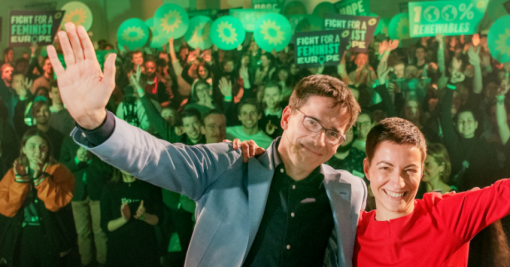The recent European Parliament elections were very heartening for Greens, with the Green Party frequently being second or third in total number of votes in any given country. There is some chance that the next President of the European Commission will be a Green. Tonight I’ll be looking at what I consider the three most important contexts of this victory. The first is as it relates to the general growth and maturity of Europe’s Green Parties. The second is the differences between European democracy and American democracy that have enabled the rise of Europe’s Green Parties, while the Green Party in this country has unfortunately remained little more than a footnote. The third is how the Green Party’s ascension fits into the overall context of European, and American, politics.
Green Parties are deeply involved in the governance of many countries in Europe. While the Green Party of England and Wales isn’t well represented in England’s Parliament, it has a strong local presence, and elected seven out of Britain’s seventy-three representatives in the European Parliament, including one who had been the Mayor of Sheffield, England’s third-largest city. The Green Party of Ireland has maintained a Parliamentary presence for much of its history and been part of the ruling coalition at times.
In Portugal, Greens are currently part of the ruling coalition. The Green Party of Spain works closely with the Podemos Party and movement, and, although not in the ruling coalition, they have a substantial say as part of the opposition. While there is only one Green representative in France’s National Assembly, the country also has a radical socialist party that polled nearly as many votes as French President Macron in the first round of voting, and the “Yellow Vest” movement, which is protesting a government that favors the wealthy, has many Green overtones. The Green Party plays a strong role at all levels in Holland and Belgium. In Luxembourg, they are part of the ruling coalition. In Italy, while the Green Party per se is somewhat in eclipse these days, the “Five Star Movement,” despite its right-wing cachet here in the US, actually espouses a great many Green values, such as “public water, sustainable transport, sustainable development, right to Internet access, and environmentalism. The party also advocates e-democracy, direct democracy, the principle of “zero-cost politics,” degrowth, and nonviolence,” according to Wikipedia.
Wait a minute, you say. Isn’t The Five Star Movement a right-wing party opposed to Italy taking in more refugees from Africa and the Middle East?
Yes, they’re opposed to taking in more refugees, but let’s not forget that all those refugees have been precipitated by a combination of US foreign policy and climate change, and it isn’t fair for the US and its neoliberal allies (such as previous Italian governments) to create a situation that sets millions of refugees in motion at the same time as the US not only closes its doors to refugees and doubles down on the aggressions that drive their flight, but spearheads the imposition of “austerity measures” that hobble the social welfare systems of the countries, like Italy and Greece, that are bearing the brunt of the crisis. But I digress. Well, everything is interconnected, so when one thing leads to another, it can be difficult to draw the line.
Back to our enumeration of the successes of European Green parties. The Austrian Green Party regularly wins elections at all levels of government, and the President of Austria is a Green, who defeated a hard-right candidate by a healthy 54-46 margin.
In Scandinavia, the Green Parties of Norway and Denmark are represented in their countries’ parliaments, the Swedish Green Party is part of the coalition that runs the country, and the Finnish Green Party has been part of ruling coalitions in the past, and remains one of the country’s largest political parties. Latvia’s Green Party has been involved in various ruling coalitions for over fifteen years. The Latvian Green Party is somewhat anomalous among Green Parties in advocating somewhat repressive social policies alongside its advocacy for the environment.
In Greece, the Green Party works with Syriza. The Green Parties in the rest of eastern Europe are mostly somewhat marginal, but all of them have much easier access to participation in government than the US Green Party, for one important reason: all of Europe’s democracies allot at least some of their parliamentary seats according to the percentage of the total vote a party receives, whether or not the party actually wins the election in any particular district. This makes it much easier for new, growing parties to be represented at the national level, show what they can do, and grow further. The existence of multiple parties in a democracy creates another condition that is absent from US politics: the formation of coalition governments, in which parties with similar views make what compromises they need to, to get along with each other, and rule the country together. This need to be friends with other political parties also makes the tone of politics in Europe somewhat more friendly, since, unlike the situation here, other political parties are not merely rivals, but also potential allies.
That can have a down side, as evinced by this example from the history of the largest, oldest, and most successful Green Party in Europe, the German Green Party. As members of a coalition government with the Social Democrats the Greens, over the protests of many of their members, supported sending German troops to Kosovo and Afghanistan, in direct contravention of the Green Party’s stated commitment to non-violence. However, the party’s open and honest debate about the question caused a greater pubic appreciation of the Green Party in the long run, and the partnership with the Social Democrats allowed the attainment of one of the original intentions of the party: the phasing out of nuclear power in Germany. The Greens are now the second-largest political party in Germany. With Angela Merkel and her neoliberal Christian Democratic Party falling out of favor due to increasing public disenchantment with their policies, a Green-led Germany may be coming soon.
That disenchantment with neoliberal politics is not by any means confined to Germany. All across Europe and America, voters are increasingly fed up with what is turning out to be the hollow promises of the so-called “centrist” neo-liberal parties. It is becoming increasingly obvious that policies that enrich and empower large corporations and their owners do not result in that wealth “trickling down” to the great mass of people. Instead, people can clearly see that their lives are getting worse, not better, and the hordes of refugees spawned by the wars waged by corporate-sponsored governments don’t help either.
One response to this has been for voters to regress into greater exclusivity and selfishness, which has resulted in the rise of right-wing, authoritarian governments and strong right-wing parties, such as Nigel Farrage in England, France’s National Rally Party, Hungary’s Fidesz, and the resurgence of fascism in German politics. Like the neoliberals, however, these parties cynically claim to represent the interests of the common people, while in fact they only concentrate power and wealth still further.
The other response to the failure of neoliberalism is to open up to the Green, democratic socialist way of doing things, a way that recognizes the realities of climate change, the reality that you can’t have a political democracy in an authoritarian, capitalist economy, and that responds with compassion to the plight of political and climate refugees–compassion not only for the refugees, but for the original inhabitants of the countries to which the refugees are fleeing. Part of that compassion, obviously, is to end the military and economic imperialism that has been devastating the refugees’ homelands. As Albert Bates observed recently,
To better prepare for the future, stop the bombing refugees and start planting forests. Yemen is a good place to start. For the price of one F-35 ($100 million and $10,000 per hour to fly) you could employ the displaced, planting trees and seeing them through to forest.
This process has also played out in the US, although our extremely restrictive electoral system makes it harder to see. On the right, the traditional corporate Republicans were overtaken by Trump’s bare-knuckles, bigoted authoritarianism, while the Democrats successfully fought off the Sanders insurgency. This resulted in the 2016 election becoming a contest between the corporatist center and the far right, exactly the kind of election that has resulted in the decline of so many long-reigning corporatist, centrist parties in Europe, and the far-right capture of so many European governments. Meanwhile, 37% of American voters approve of socialism, which is quite a contrast to the 28% who voted for Hillary Clinton and the 27% who voted for Trump.
Clearly, there is a potentially winning plurality for a political swing towards socialism in this country, especially the kind of co-op/worker-owned enterprise socialism favored by The Green Party, but we have yet to overcome the twin shackles of an electoral system that is stacked by the corporate parties–Republicans and Democrats–against any new party, and also by this country’s corporate-owned media, which rarely have anything good to say about Bernie Sanders, let alone The Green Party . I think it is significant that the corporate media–in this case Facebook and Google–took advantage of the staged brouhaha about “Russian interference” and “fake news” to label homegrown non-corporate, anti-neoliberal, socialist-leaning media as the problem, and soft-censor such sites, cutting back on their ability to reach new readers.
We’ve got to continue to do everything we can to keep putting out real information about neoliberal imperialism, and real information about the alternatives, and to keep running candidates who represent those alternatives. Just as the Soviet suppression of criticism of what you might call “corporate communism,” in which the state, not the workers, was the boss, failed to maintain the Soviet system, and ultimately resulted in its catastrophic collapse, suppressing criticism of, and alternatives to, corporate capitalism will only make its collapse more catastrophic. This is made all the more dire by the timing: the Soviet Union collapsed in a time of climate and resource stability, while corporate capitalism is beginning to fly apart at the same time as our climate is growing increasingly chaotic, while we are reaching the end of the oil and mineral reserves that have enabled our complex technical civilization. At a time when we need greater political, economic, and cultural flexibility, we here in America are not able to exercise it.
It is good that the Europeans are beginning to recognize the wisdom of the Green vision, but in a world as interlinked as ours, we are all going to have to make the necessary changes in order for any of us to survive. Yo, America–wake up!
Dr. John–Promises, Promises
Didn’t He Ramble (vocal by Van Morrison)
Neville Brothers--Brother John Is Gone/Iko Iko
Leave a comment